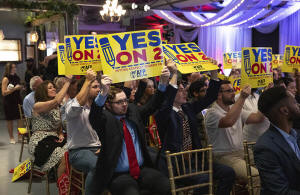A push for school choice fell short in Trump's first term. He may now
have a more willing Congress
 Send a link to a friend
Send a link to a friend
 [November 09, 2024]
By ALIA WONG [November 09, 2024]
By ALIA WONG
WASHINGTON (AP) — The election of Donald Trump returns an ally of school
choice to the White House, this time with a Republican-controlled Senate
— and potentially House — that could be more supportive of proposals
that fizzled during his first term.
Although proposals to expand private schooling suffered high-profile
defeats in several states, Trump’s victory has brought new optimism to
advocates of supporting school choice at the federal level. One of their
main priorities: tax credits for donations to organizations that provide
private school scholarships.
Jim Blew, who served as an assistant secretary in the U.S. Education
Department in the first Trump administration, said he's hopeful the new
Congress will greenlight ideas like tax credits for scholarships.
“The new members are all very clearly supportive of school choice, and I
think that’s going to change the dynamics,” said Blew, who co-founded
the conservative Defense of Freedom Institute.
Private school choice comprises several ways of using taxpayer money to
support education outside of traditional public schools, including
vouchers, education savings accounts and tax-credit scholarships. The
idea of giving this option to all families regardless of income — known
as universal private school choice — has soared in popularity in recent
years and is now enshrined in law in a dozen states. Nearly three dozen
states have some form of private school choice.

Yet the concept has faced pushback — and not just from groups like
teachers unions that have long advocated for keeping public money in
public schools. Some conservatives in states with large rural
communities have questioned the programs’ merits, citing the lack of
private schools in sparsely populated areas. In those areas, public
school districts are often the largest employer.
In Tuesday's election, voters in Kentucky rejected a measure to enable
public funding for private school attendance, and Nebraska voted to
partially repeal a law that uses taxpayer money to subsidize private
education. A proposed constitutional amendment in Colorado that would've
established schoolchildren's “right to school choice” also was defeated.
Concerns about diverting money from public education appeared to gain
traction in deep-red Kentucky and Nebraska. Ferial Pearson, the chair of
an organization in Nebraska that advocates for public education, said it
would continue working to provide public schools “the support and
resources they need to thrive.”
In Kentucky, Democratic Gov. Andy Beshear said Thursday that voters sent
a clear message that taxpayer money should go to public schools.
“This should end any and all debate. And this should end any attempts to
take money away from our public schools to send them to unaccountable
private schools,” Beshear said at a news conference. He renewed his
pitch for larger pay raises for public school teachers and other school
personnel, along with his plan to establish universal pre-K across
Kentucky.
To some observers, it was unsurprising that even states that voted for
Trump took a stand against school choice.
“Especially in the wake of the pandemic, with all the school closures
and learning loss and chronic absenteeism, parents want something
different — but they also like their public schools,” said Liz Cohen,
the policy director at FutureEd, a nonpartisan research center at
Georgetown University. “People want something new, but it doesn’t mean
they want to get rid of everything.”

[to top of second column]
|

Supporters of Kentucky's Amendment 2 wave signs and foam fingers as
U.S. Sen. Rand Paul, R-Bowling Green, speaks at the Americans for
Prosperity—Kentucky rally for Amendment 2 at La Gala in downtown
Bowling Green, Ky., Monday evening, Oct. 28, 2024. (Grace Ramey
McDowell/Daily News via AP)

Cohen, who has studied private school choice expansion across the
country, emphasized decisions on a ballot measure “feel a lot more
local and specific than who you’re voting for for president.”
During his campaign, Trump touted school choice as a form of greater
parental rights, aimed at countering what conservative critics
describe as leftist indoctrination in classrooms and promoting a
free-market approach to education.
One of his platform pledges is to “serve as a champion for America's
homeschool families” and “to protect the God-given right of every
parent to be the steward of their children’s education.” He proposes
allowing homeschooling families to use 529 college savings plans for
spending on their children’s educational expenses, an option he
advanced for private-school families during his first term.
In that term, Trump tapped Betsy DeVos — a fervent supporter of
school choice — as his education secretary. That administration,
however, struggled to get its school choice pitches off the ground.
An effort to provide federal tax credits for scholarship donations
flopped, as did proposals to slash federal public school programs by
billions of dollars.
With a more favorable Congress, those initiatives could have a
better shot. U.S. Sen. Bill Cassidy, a Louisiana Republican and the
frontrunner to chair the Senate Committee on Health, Education,
Labor and Pensions, has supported tax incentives for scholarship
donations. And Republican House Speaker Mike Johnson has said he
will focus the next Congress on “maximizing school choice for
parents and holding woke university administrators accountable.”
Some conservatives argue there would be benefits to leaving the
issue to states.
“I … worry that we’re going to return to the political dynamics of
Trump’s first term, which were very bad for the charter schools
sector in blue states,” said Michael Petrilli, the president of the
Fordham Institute, a right-leaning think tank. “Because Trump
strongly supported school choice, including charter schools, he made
those issues radioactive on the left, so reform-oriented Democrats
were sidelined or silenced.”

In other races around the country, preliminary results show
victories for school board candidates in Los Angeles and Chicago
were concentrated among candidates who promoted traditional public
education over alternatives such as charters.
In Texas, various pro-voucher legislators endorsed by Republican
Gov. Greg Abbott won their races. Abbott had sought to unseat GOP
legislators who’d voted against a plan to subsidize private school
tuition with public money. The newly elected candidates could give
Abbott the votes needed to pass that voucher legislation.
___
Associated Press writer Bruce Schreiner contributed to this report
from Louisville, Ky.
All contents © copyright 2024 Associated Press. All rights reserved |